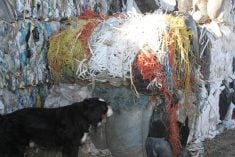WINNIPEG – There’s a saying in the world of sports that sometimes the best deal is the one you don’t make.
That might apply to James Richardson International and its failed bid to take over Agricore United last year.
The company lost the bidding war to Saskatchewan Wheat Pool, which resulted in the creation of Viterra.
At first there was disappointment.
“We were fully intent on succeeding and went as far as was reasonable to go,” said JRI president Curt Vossen.
Read Also

Alberta looks for agricultural plastic management input
Alberta provincial government giving agriculture industry a say through survey in shaping future plastics management
“It would have been a great combination.”
However, the consolation prize has turned out to be pretty good.
“The arrangement that we constructed in the late stages of that whole process has proven to be an extremely successful one for our company,” Vossen said in an interview in his 28th floor corner office in JRI’s office tower at the corner of Portage Avenue and Main Street, overlooking downtown Winnipeg and the Red River.
Here’s what JRI received in return for abandoning its pursuit of AU:
- Fifteen grain elevators from the Pool, including 13 high-throughput facilities, for $315 million.
- Nine farm supply centres from the Pool for an undisclosed amount.
- A $35 million termination fee from AU.
As well, the company didn’t have to spend the $1.8 billion it was offering for AU.
Vossen said those transactions provided immediate benefits to the company. It picked up assets that were ideal to fill gaps in JRI’s grain collection and farm service network, and it didn’t become saddled with assets it didn’t want.
Perhaps most importantly, he said, JRI retained 95 percent of the employees at those facilities, allowing for a seamless transition with workers who knew local markets and had longstanding relationships with farmer customers.
“We integrated everything quite quickly and successfully and the business was ready to take advantage of this surge in global commodity values as we went through the balance of 2007 and into 2008,” Vossen said.
“It was good timing.”
It would have taken much longer to fully integrate the entire AU network, he added, although he acknowledged Viterra has done an excellent job combining the two companies.
And just as Viterra has been recording sizable profits in the past six months, so has JRI.
While the family owned company doesn’t release financial results, Vossen said it is having “an excellent year,” thanks to the new acquisitions and the buoyant grain and agricultural economy.
During the takeover battle, JRI took the unprecedented step of releasing financial statements showing the company earned net income of $36 million in 2006, up from $26 million in 2005 and $19 million in 2004, a period when SWP and AU were frequently posting losses.
Anil Passi, a grain industry analyst with Dominion Bond Rating Service, said JRI is in a good position.
“It seem like they’ve integrated the new assets well,” he said.
“My sense is they’ve filled in some gaps and gained some synergies.”
He said the company showed exceptional discipline when it decided to drop out of the bidding war for AU when the price moved beyond its comfort zone.
“In doing that, they struck a nice deal where they got some win out of the situation and got some good value,” Passi said.
JRI has traditionally had a 13 to 15 percent share of the grain handling market, but that has increased to 23 to 24 percent and will likely settle in the short term at 25 to 27 percent. The long term target is 28 to 30 percent.
Viterra’s market share is 44 percent.
JRI operates 51 primary elevators under the name Pioneer, about half as many as Viterra.
Part of JRI’s increase in market share will occur as a result of a $75 million investment in grain storage and rail car spotting capacity at about a dozen facilities across Western Canada.
Vossen said the company has no plans to buy more elevators, although he wouldn’t rule it out in the future.
He said if the company achieves a 30 percent market share, that will likely represent a ceiling in terms of the potential for growth in the grain handling and merchandising business.
“That means we will need to find new opportunities connected with what we do,” he said, such as the $150 million canola crushing facility it is building in Yorkton, Sask.
“We’re being very diligent in looking at all opportunities,” although he noted that the cost of acquiring or building new facilities has risen sharply.
“You have to be very prudent in what you do,” he said.
“There is no room for error.”














